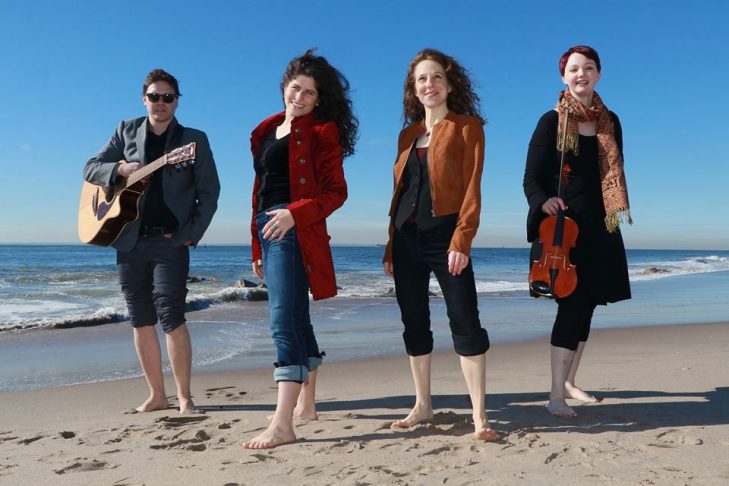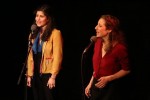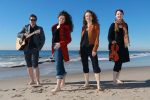For Kristen Plylar-Moore and her musical partner and wife, Julia Ostrov, the 2016 presidential election was challenging spiritually and politically. In response, the two musicians founded Revival, an ensemble group that performs Plylar-Moore’s original story-based songs of faith and social justice. Ostrov is one of the group’s singers.
For the past couple of years, Revival has mainly performed in synagogues, where the group has attracted multigenerational audiences of all faiths. The two women spoke to JewishBoston in advance of their upcoming weekend concerts at Temple Beth Elohim in Wellesley on Friday, April 26, and the 384 Harvard St. community in Brookline on Saturday, April 27.
How did the Revival ensemble come together?
Kristen Plylar-Moore: I started writing the songs in the fall of 2015. The writing started as a response to the political climate in this country, which included the dehumanizing rhetoric around immigrants and other groups. As the presidential campaign progressed, I had enough songs by 2016 for a show. Many of those songs were rooted in Hebrew biblical text. For me, they were texts commonly shared across our country as moral guidance. It felt important to root them in our common stories. Once we had this collection, I began to think about recording it. Julia is a singer, and we auditioned instrumentalists.
Julia Ostrov: Our first concert was in December 2016. It was a three-night run at a women’s and trans theater collective in the East Village. It was a very lively performance, and we received enthusiastic feedback. From there we envisioned playing in progressive spiritual spaces.
How do you define your musical style?
Plylar-Moore: I was born and raised in San Antonio, Texas, and influenced by country, pop and folk music. I was also raised Catholic and played the guitar in the church choir. When I finally wrote my own pieces, pieces from country to pop to Catholic hymns shaped my style. My background in theater and drama—I have a master’s degree in educational theater and taught theater for many years to kids—allows me to bring a theatricality to how these stories are told and how the lyrics are conveyed.
- Ostrov: All of these songs are story-driven. Each song is its own world, and they’re very lyrically potent. As a performer, I enjoy singing songs that take me on a journey. While our music is folk rock with various influences, as Kristen mentioned, there’s a theatrical quality to it. Revival is currently a concert performance. However, Kristen is working on expanding the show into a more theatrical musical piece with a narrative arc.
Revival seems to be an interfaith initiative in which you combine lyrics from Jewish texts and Christian scriptures. How does this approach reflect your values?
Plylar-Moore: The voices that are currently dominant in this country tend to be more conservative politically. In the mainstream progressive movement, there are strong religious communities that express values that convey dignity and compassion for everyone. It’s important to me that our ancient shared texts and stories—stories that have often been used to justify oppression and the dehumanizing of people—be reclaimed as our stories. Here are other values that we can take away and claim as part of our identity too. The result is songs that are mostly rooted in Hebrew biblical text with some gospel influences that celebrate the divine in each person.
Ostrov: Part of what this show does is to bring people together in a community setting, offering a sense of nourishment. It allows a community to celebrate people who are doing social justice work. It can be difficult dealing with the news, or just getting through the day. Our concert offers a collective opportunity for spiritual replenishment.
You are intentional about where you perform. You describe these locales as “progressive spiritual spaces.”
Plylar-Moore: Julia and I got together in the fall of 2005. It was Rosh Hashanah and we went to Congregation Beit Simchat Torah (CBST) [in New York City]. I felt like I had come home. There was a familiarity in the shared stories of Genesis and even some of the rituals. To have that in the context of a Jewish faith that was welcoming and celebrating queer people like me was a perfect bridge for me. The more I learn and participate in Judaism, the more it feels like the place I belong.
Ostrov: Deciding where we perform has been a very organic process for us. We’ve asked ourselves, what is our community? CBST has been our spiritual community for a decade. We first reached out to CBST about performing the show, and they were very open to it. I use the words “progressive spiritual spaces” because the show can work in any number of spaces. Until now we’ve mostly performed in synagogues, but any spiritual community that is open to our values is a place we’d love to perform.
Can you recommend a song from your album that’s a good introduction to your music?
Plylar-Moore: “You Were Strangers” was the first song I wrote in this collection, and it set off all the other songs. The song is based on the verse from the Torah that we were once strangers in the land of Egypt. It speaks directly to welcoming the stranger and to welcoming immigrants and refugees. It’s well timed for Passover. It captures that instance when we recognize the dignity of people, despite the messages trying to dehumanize people.
Ostrov: In terms of appeal to the broadest audience, I think “I Am” is a good introduction. It’s our crossover song, it’s secular, but it’s also about celebrating the divine in each person.
This interview has been edited and condensed.
Learn more about Revival here.
Never miss the best stories and events! Get JewishBoston This Week.
Judy Bolton-Fasman is the former arts and culture writer for JewishBoston.com. Her award-winning essays and articles have appeared in The New York Times, The Boston Globe, The Forward, Tablet Magazine, Cognoscenti and other venues. Her memoir, “Asylum: A Memoir of Family Secrets,” was published in 2021.





